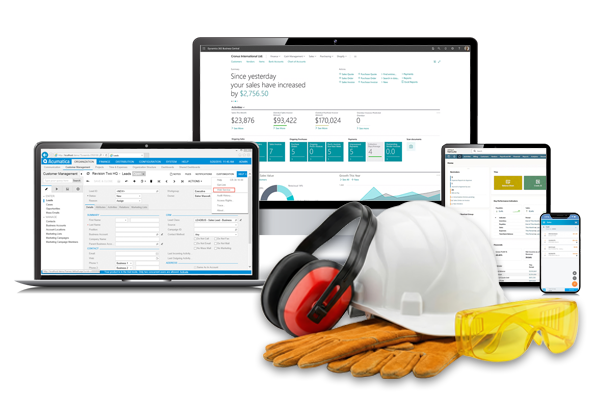ARTICLE | 5 MIN READ
Cloud-Based ERP: Minimize Downtime and Boost Reliability
Keep your business agile and secure.

It’s 3 p.m. on a Wednesday, and Tanya, the operations manager at a manufacturing plant, is finally hitting a rhythm—until the ERP system decides it’s happy hour. Production stops cold, trucks are delayed, and someone in HR is frantically Googling “how to calm workplace panic.” Meanwhile, Tanya is left juggling explanations to customers while creating a support ticket titled “SOS: ERP meltdown.”
Downtime like this isn’t just frustrating—it’s costly. Delays pile up, morale dips, and revenue takes a hit. This is where the cloud ERP benefits of a system like Microsoft Dynamics 365 Business Central make all the difference. By minimizing downtime with features like predictive maintenance, automated updates, and built-in redundancy, your system can skip the half-priced drinks and focus on what matters: keeping your business moving.
Keep reading to learn how cloud-based ERPs like Dynamics 365 Business Central redefine reliability for modern businesses. We’ll cover the evolving role of the cloud in ERP systems, the proactive features that minimize downtime, and how scalability and security ensure uninterrupted operations. Whether managing production schedules or protecting sensitive financial data, you’ll see why the cloud is the MVP of ERP systems.
The Evolving Role of Cloud in ERP Reliability
Not long ago, the cloud was seen as just a convenient storage option—a digital filing cabinet for data. Today, it’s the backbone of modern business systems, delivering reliability and stability for critical tools like ERPs. This evolution is driving the global cloud ERP market’s projected growth to $34.83 billion by 2030, with an annual growth rate of 18%. For businesses using Microsoft Dynamics 365 Business Central, the cloud has transformed ERP systems from reactive tools into proactive solutions.
Powered by Microsoft Azure, Business Central ensures ERP system performance remains steady, with real-time monitoring, global accessibility, and redundancy built into the platform.
If a server goes down, cloud systems ensure operations continue seamlessly—no scrambling required. Unlike traditional on-premises systems, which often rely on a single point of failure, cloud-based ERPs are built with layers of protection to keep your business running smoothly.
The cloud isn’t just storage—it’s your ERP’s most reliable teammate, ensuring uptime and operational stability. With proactive tools like predictive maintenance and automated updates, it also sets the stage for minimizing downtime and keeping your business running seamlessly.
Minimizing Downtime with Proactive Cloud Capabilities
Downtime doesn’t just disrupt—it drains resources and tests patience. Fortunately, cloud-based ERPs like Dynamics 365 Business Central come equipped with proactive tools to conquer disruptions before they start.
Predictive Maintenance
Sensors integrated with the cloud collect real-time data on equipment, identifying potential issues before they become expensive failures. By scheduling repairs proactively, businesses can avoid hours—or even days—of halted operations.
For example, a toy manufacturer might temporarily increase system users during the holiday rush—similar to rotating players during a game to keep everyone performing at their best. Likewise, an accounting department can scale resources during tax season, ensuring the workload is managed efficiently without overwhelming the team.
Automated Updates
Cloud systems handle updates seamlessly in the background, ensuring you’re always running the latest and most secure version. Say goodbye to the headaches of manually managing patches or upgrades.
Built-in Redundancy
With automatic backups and fail-safes, cloud-based ERPs are like having a silent hero watching over your systems, ready to step in before disruptions derail your business. When hardware or networks fail, redundancy ensures your operations continue without skipping a beat. Instead of needing to react to a crisis, you’re protected from the start, minimizing downtime and safeguarding critical workflows.
Business Impact
The result? Smoother day-to-day operations, fewer disruptions, and reduced revenue losses from unexpected outages. Teams can focus on delivering results instead of scrambling to troubleshoot, keeping morale and productivity high even during challenges.
What sets Dynamics 365 Business Central apart is its integration with Microsoft’s powerful Azure platform, delivering unparalleled redundancy, reliability, and global accessibility—keeping your business ahead of the competition.
To truly understand the dramatic results that minimized downtime can have, consider how one manufacturing company avoided costly production halts by integrating cloud-based predictive maintenance into its ERP system:
Sensors on production equipment now send real-time performance data to the cloud, where the ERP flags wear-and-tear trends before they escalate into failures. Maintenance is scheduled proactively, saving the company from costly production halts and ensuring the line keeps moving smoothly.
This proactive approach safeguards operations and reinforces customer trust by ensuring consistent delivery schedules.
Enhanced Reliability Through Scalability and Flexibility with Proactive Cloud Capabilities
One of the chief advantages of a cloud-based ERP is its cloud scalability, allowing businesses to adjust resources seamlessly for seasonal or operational needs. Whether ramping up for a seasonal rush or adapting to new market demands, the cloud provides the necessary flexibility—without compromising reliability.
Scalability for Seasonal Demands: A toy manufacturer might temporarily add users during the holiday season, while an accounting department might scale resources during tax time. With a cloud ERP, you only pay for what you need when you need it.
Flexibility Without Downtime: Cloud-based systems let you adjust resources or add users seamlessly, all while maintaining uptime and system performance.
The cloud ensures your ERP stays agile and adaptable, responding to your industry’s natural cycles and demands while delivering consistent reliability. This unique balance of flexibility and stability makes migrating to Dynamics 365 Business Central an exceptional choice for growing businesses.
Data Security and Business Continuity
Data breaches and system outages aren’t just costly—they’re high-risk events that can jeopardize a company’s reputation in many areas, including compliance and financial reporting. That’s why security and continuity are at the core of cloud-based ERPs like Dynamics 365 Business Central, ensuring sensitive financial data remains protected and operations uninterrupted. A few advantages include:
Built-in Security Features: Encryption, firewalls, and continuous monitoring provide robust protection against cyber threats.
Disaster Recovery Plans: Cloud systems include automatic backups and redundancy, ensuring your business can recover quickly—even in the face of hardware failures or cyberattacks.
Cloud vs. On-Premises: On-premises systems often fall short when it comes to security and continuity. Limited resources and manual updates leave them more vulnerable to breaches and downtime.
By combining advanced ERP security with seamless recovery options, Dynamics 365 Business Central ensures your data and operations remain protected. Yes—safeguarding your systems is critical—but so is maintaining your customers’ trust and your business’s future.
Prepare for Any Challenge
The bottom line here is that downtime is expensive, frustrating, and entirely avoidable with the right tools. Cloud-based ERPs like Microsoft Dynamics 365 Business Central offer reliability, scalability, and security to keep your operations running smoothly—no matter what challenges arise. From predictive maintenance to built-in redundancy, the cloud can empower your business to stay competitive, agile, and focused on growth.
If uninterrupted operations and a dependable ERP system are priorities for your business, reach out to discuss how moving to the cloud can help you minimize downtime and maximize performance. With Dynamics 365 Business Central, the cloud isn’t just a tool—it’s the key to a business that runs more efficiently than ever before.
About the Author
Pat Bostick is an ERP Solution and Practice Strategist at Cargas, where he has spent nearly six years expanding the impact of Microsoft Dynamics 365 Business Central and GP solutions. With over 45 years of experience in digital transformation, Pat’s expertise includes business process consulting, enterprise software sales, and customer relationship management (CRM).
A former leader at Microsoft, Pat has seen the technology landscape evolve from punch cards to AI and machine learning, always with a focus on optimizing the customer journey. His passion for driving growth through innovative ERP solutions continues to shape the future of enterprise technology at Cargas.

Let’s Chat
Still have questions? Get in touch with our expert team of software professionals.



